Long Live Fidel! A hero of the liberation struggle, a man of high principles
By Askia Muhammad -Senior Editor- | Last updated: Nov 29, 2016 - 1:12:53 PMWhat's your opinion on this article?

|
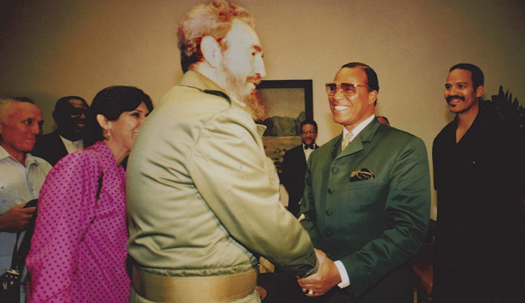
The Honorable Minister Louis Farrakhan greets Fidel Castro
|
WASHINGTON—Fidel Castro, the Commandant of the Revolution is dead. Long live the Revolution!
“One of the greatest, revolutionary thinkers and practitioners of our time,” said the Honorable Minister Louis Farrakhan of the Nation of Islam.
Former Cuban president Fidel Castro, who ruled the Caribbean island neighbor of this country for 47 years despite decades of bitter economic sanctions and more than 630 U.S. assassination attempts, died of apparent natural causes Nov. 25. He was 90.
His steadfast, unwavering commitment to helping provide a better quality of life for the 12 million people of Cuba, as well as to millions more throughout Latin America and Africa, made Mr. Castro a hero to millions around the world, while he was the archenemy of 10 former U.S. presidents, who—with the assistance of the CIA— attempted unsuccessfully to bring him to his knees. Mr. Castro had been in poor health since 2006. He formally ceded power to his younger brother, Raúl, in 2008.

President Barack Obama normalized relations with Cuba in 2015. (R)President Obama greets Cuban clergy.
|
His Cuban revolution and its ideas inspired revolutionary efforts across the globe. His forces assisted guerrillas and revolutionary governments. In the 1970s, Mr. Castro sent Cuban troops to Angola to help that government defeat South African insurgents and help win Namibia’s independence from South Africa in 1990.
“Revolution is having a sense of the moment,” Mr. Castro said in a speech to his fellow Cubans in the 1980s, according to a translation published by “Democracy Now!”
“It’s changed everything that must be changed. It’s complete equality and freedom. It’s to treat and be treated like a human being. It’s emancipating ourselves for ourselves and by our own strength. It’s challenging the dominant forces inside and outside the country. It’s defending our values at any price,” Mr. Castro said.
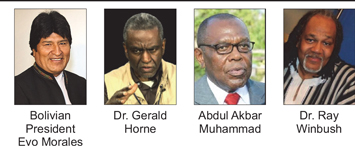
|
“That is something any schoolchild in southern Africa can tell you. Secondly, when you think of Fidel Castro, you think of the doctors, not only the Cuban doctors who are still doing yeoman’s service in Latin America and in Africa, but also of the doctors from those regions that were trained in Cuba, then go back to their homelands. So, to me, that’s the revolutionary legacy of Fidel Castro,” said Dr. Horne.
“Because of Fidel Castro and his principled stand and tremendous tenacity of will, Cuba has impacted the entire world,” Abdul Akbar Muhammad, international representative of Minister Farrakhan and the Nation of Islam told The Final Call. “This is why the death of Fidel Castro was reported from every quarter of the world.”
“Fidel as a man, Fidel as a brother, a great human being. Fidel as a politician, a great revolutionary. Fidel Castro is a great teacher in principles and values, a teacher of revolutionaries,” Bolivian President Evo Morales said of Mr. Castro’s passing. “His fight has not only been for the Cuban people nor for the people of Latin America. The fight of Fidel has been for the people of the world that fought for freedom.”
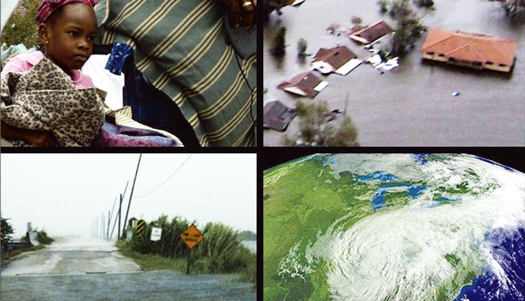
Few know that Fidel Castro offered to assist the U.S. after hurricane Katrina. The offer was refused by then president George W. Bush. |
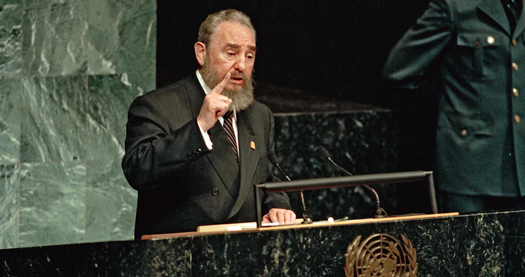
Fidel Castro , President of the Council of State and of the Council of Ministers of Cuba and current Chairman of the Non-aligned States, paid a visit to United Nations Headquarters and addressed the General Assembly. President Castro spoke Oct. 12, 1979. Photo: United Nations Photo
|
“He was committed to help those individuals who struggled to bring a better quality of life,” Mr. Muhammad continued, “and he can boast as he leaves us: Imagine a country producing so many doctors that they can send doctors throughout the world. Imagine a country where there is no illiteracy at all, unless you’re a person that just refused to learn or to go to school. Imagine a country where there is no challenge for people becoming sick to try to find money for a doctor.”
There is much praise for Mr. Castro in Black academic circles. “Castro for Black people, means—and I’m old enough to remember when he slept in Harlem; or when he sheltered Assata Shakur; and made places for people like Robert Williams—(author of) ‘Negroes With Guns’ (who propagated)—the idea of self defense,” said Dr. Ray Winbush, director of Morgan State University’s Institute for Urban Research in an interview.
“People forget, or don’t even know how, during Katrina 11 years ago that Castro offered (U.S. President George W. Bush) help with treatment of people. Of course the United States refused. Castro outlived 10 U. S. presidents, despite all those attempts on his life; despite a Bay of Pigs invasion; it only increased his popularity, both in his home, as well as around the world.
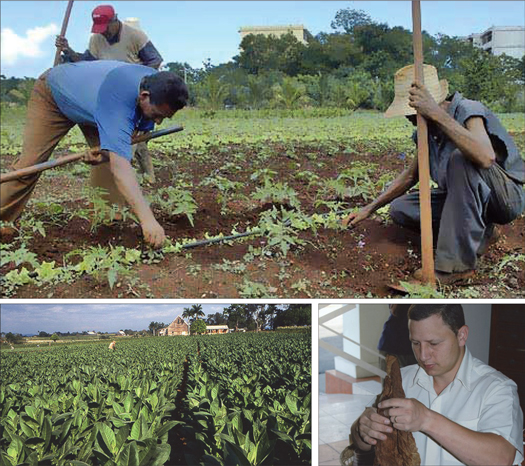
Cuba’s world renown cigar industry is just part of their agricultural involvement. The country revolutionized urban farming and permaculture after numerous embargoes forced the island nation to find better, more sustainable ways to produce food.
‘Many people talk about doing good for the people, and they talk about Jesus, and what Jesus did; but not only Commandante, do you talk about it, but you do this work.’ –Minister Louis Farrakhan |
“People forget that he helped finance and fight—with the blood of Cubans—to overthrow many of the colonial powers, when Africa was being liberated in the ‘50s and the ‘60s,” said Dr. Winbush. “We owe him a debt. It was the rich oligarchs” who opposed him, and whose descendants make up the Cuban exile community living in South Florida, he said.
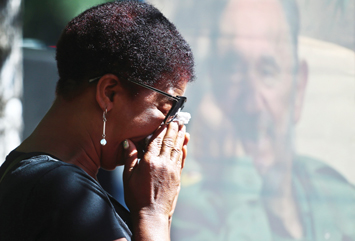
A woman cries outside Cuba’s embassy where an image of late Fidel Castro hangs in Santiago, Chile, Nov. 26. Castro, who led a rebel army to improbable victory, embraced Soviet-style communism and defi ed the power of 10 U.S. presidents during his half century rule of Cuba, died at age 90 in Cuba late, Nov. 25.
|
Those are the same people who “profit off the poor,” and are the very ones “who he kicked off the island,” said Dr. Winbush. They were the supporters of the U.S.- backed dictator Fulgencio Batista who fled the island January 1, 1959.
American commentators and political leaders almost uniformly condemned Mr. Castro, except, that is President Barack Obama, who offered condolences to the Castro family and to the Cuban people. “At this time of Fidel Castro’s passing, we extend a hand of friendship to the Cuban people,” Mr. Obama said in a prepared statement.
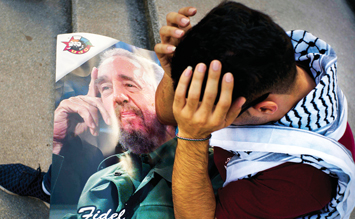
Palestinian medical student Adham Motawi, with an image of Fidel Castro, holds his head in disbelief during a gathering in Castro’s honor in Havana, Cuba, Nov. 26, the day after his death. Cuba will observe nine days of mourning for the former president who ruled Cuba for half a century.
|
“Today, we offer condolences to Fidel Castro’s family, and our thoughts and prayers are with the Cuban people. In the days ahead, they will recall the past and also look to the future. As they do, the Cuban people must know that they have a friend and partner in the United States of America,” Mr. Obama said.
Mr. Castro described himself as a Marxist-Leninist, a Communist, an atheist. But he displayed humility, and commitment to the well being of his people, with no apparent concern for his own enrichment … and deep spirituality.
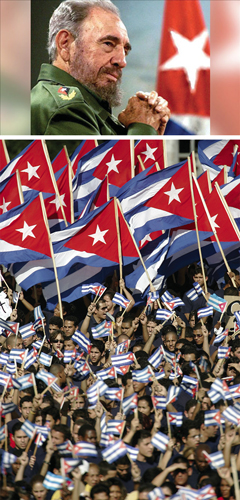
Honor guard raise the Cuban flag at the reopened U.S. embassy in Havana.
|
“Minister Farrakhan said to him, that ‘many people talk about doing good for the people, and they talk about Jesus, and what Jesus did; but not only Commandante, do you talk about it, but you do this work.’
“‘People look at you, they can see, what they believe in their faith traditions. They see you’re not only talking about it but you’re doing it.’ I remember that conversation,” Mr. Muhammad continued.
But, Mr. Muhammad observed, there were other ties to the Nation of Islam: When the young revolutionary made his first trip to speak at the United Nations, he stayed in Harlem and met with Min. Malcolm X of the Nation of Islam. The Nation’s newspaper, Muhammad Speaks, covered the Cuban revolution and its developments consistently with articles and photographs. After the 1995 Million Man March, Min. Farrakhan made one of many important trips to Cuba, was received by President Castro and engaged in deep discussions about the state of oppressed peoples in the world. The meeting between the Cuban visionary leader and the Black America visionary leader and delegation lasted for 3 hours and 20 minutes, instead of the scheduled 20 minutes. The Nation loved and respected the principles of the Cuban revolution and their right to choose their way of government, Mr. Muhammad said. Min. Farrakhan spoke on Cuba TV during visits and the Nation was allowed to hand out Holy Qur’ans because of respect for its mission, he added. There was respect for the Nation of Islam’s mission to uplift the masses of the people and stand for justice, Mr. Muhammad said.
Mr. Castro’s enormous reservoir of virtue apparently grew “cut of his spirituality,” Minister Farrakhan said in an exclusive Nov. 26 interview. “It didn’t have to be religion, because much of religion and religiosity is hypocrisy. He was a deeply spiritual man, though he spoke in practical terms.”
“I first visited Cuba in 1977 as his guest, when I left Cuba I landed in Barbados. They asked me how could I visit a ‘Communist country?’
“I asked them, ‘Are they Christian?’ And they said, ‘Yes.’ Well Jesus spoke of two men who were asked to do the Will of God. One said he would and he didn’t. And the other said he wouldn’t, but he did. And Jesus asked, ‘Which of these two men did the Will of God? The one who said he would, and didn’t, or the one who said he wouldn’t, and did?’
“I said, ‘Here you are, a Christian country, yet you don’t do what Jesus said, when he asked his disciples: When was I naked and you clothed me not? When was I hungry and you fed me not? When was I sick and in prison and you ministered not unto me? When was I out of doors and you gave me not shelter?’
“And the average Christian nation has not done this. But here is a man who doesn’t claim religion, but he feeds the hungry. No one is without a home. They have free education from kindergarten through college. He has free medical care.
“I said, ‘Which one of you, both the Christians or the so-called agnostics or atheists, which one of the two of you have done the Will of God?’ (Mr. Castro) was more of a deeply committed spiritual man than many who preach religion and say lots and lots of prayers. He may not have said a lot of prayers, but his deeds were the answer to many peoples’ prayers. One of the greatest revolutionary thinkers and practitioners of our Honor guard raise the Cuban flag at the reopened U.S. embassy in Havana. Time,” Minister Farrakhan concluded.
INSIDE STORIES AND REVIEWS
-
-
About Harriett ... and the Negro Hollywood Road Show
By Rabiah Muhammad, Guest Columnist » Full Story -
Skepticism greets Jay-Z, NFL talk of inspiring change
By Bryan 18X Crawford and Richard B. Muhammad The Final Call Newspaper @TheFinalCall » Full Story -
The painful problem of Black girls and suicide
By Charlene Muhammad -National Correspondent- » Full Story -
Exploitation of Innocence - Report: Perceptions, policies hurting Black girls
By Charlene Muhammad -National Correspondent- » Full Story -
Big Ballin: Big ideas fuel a father’s Big Baller Brand and brash business sense
By Bryan Crawford -Contributing Writer- » Full Story






 Click Here Stay Connected!
Click Here Stay Connected!








